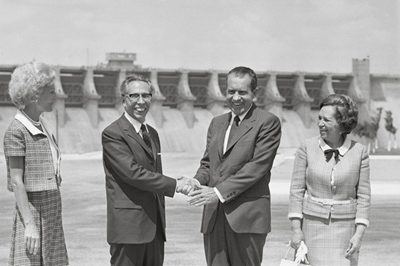At 2:30 pm on Saturday September 21 1969, US president Richard Nixon announced ‘the largest peacetime search and seizure operation in history.’ Intended to stem the flow of marijuana into the United States from Mexico, the three-week operation resulted in a near shut down of all traffic across the border and was later referred to by Mexico’s foreign minister as the lowest point in his career.
Guest James Martin from UT’s Department of History describes the motivations for President Nixon’s historic unilateral reaction and how it affected both Americans as well as our ally across the southern border.
Guests
 James MartinWestern Hemisphere Institute for Security Cooperation
James MartinWestern Hemisphere Institute for Security Cooperation
Hosts
 Christopher RosePostdoctoral Fellow, Institute for Historical Studies, The University of Texas at Austin
Christopher RosePostdoctoral Fellow, Institute for Historical Studies, The University of Texas at Austin
Today we’re going to be talking about Operation Intercept. So why don’t we just jump right in with me asking: what was Operation Intercept?
In 1969, September 21st, the United States launched what the newspapers dubbed ‘The largest peacetime search and seizure operation in history.’ Basically, the entire US-Mexican border was almost militarized to the point where border agents were called in, military from, for example, Fort Bliss were called up to patrol the border, and the intent of the operation was to search for drugs, particularly marijuana.
Where did this idea come from, that the border needed to be militarized?
September 16th, 1968, Nixon, in one of the more interesting campaign speeches, dubbed the ‘law and order campaign’ speech, felt that something needed to be done. The drug problem was getting out of hand. Crime was out of control and the US government wasn’t doing enough about it. He called for things like doubling the border security, and also some kind of international effort to stem the drug trade, which had, in his opinion, had grown completely out of control.
So you mention that this is a campaign promise that Nixon is making while he’s preparing to be elected for president. What was this in response to? Was there a growing drug problem in the United States? Or are we seeing more drugs coming across the border? Or was it what we’ve become more familiar with, this sort of powerful rhetoric of campaign promises?
There was an actual increase. You see the charts in the archives, doubling year on year of marijuana consumption among the youth. There’s also what historians have dubbed the ‘silent majority.’ There was this group that wasn’t talking but was really concerned about their personal safety. This gets into things like the race riots and other issues that Nixon was tapping into in order to seem tough. Nixon is the cold warrior of the cold warriors, but he lost to Kennedy in ’60 on at least example of not being tough enough on Cuba. So he just wanted to, in my opinion, perceive this tough image of protecting the American family.
And of course this is also coming on the heels of things like Woodstock and the Summer of Love, which as we all know the popular image of that is free substance abuse. (ed’s note: Woodstock was in 1969.)
Sure, that’s all playing in the air and it’s really affecting the rhetoric I think.
So he does this in 1969, so clearly this is one of the first major initiatives he took on after he was elected president. So what happened?
So he gets elected and now he has to fulfill this campaign promise. There’s a task force. The point-man of the task force is a fellow by the name of John Ehrlichman and also Gordon Liddy, and several others. If those names sound familiar to any body out there, they were later implicated in the Watergate scandal. So these were characters to say the least. And it was a mix of different departments. You have the justice department, the department of defense, the treasury department: they were all in on the planning table. The only person who was really missing who had any advisory role was the State Department. So as you can imagine, when you’re planning an event without the State Department, the diplomatic wing of the US government involved, it tends to focus on domestic issues and not so much on the international context.
And of course, since this is a border campaign to stem marijuana from coming in from Mexico, that’s a noticeable oversight.
Right. So everything in the recommendations that are eventually turned into Operation Intercept focused on security issues, and even minor issues. One of the recommendations, for example, was to increase the size of the parking lots on the border so people would walk across on some of the border towns instead of taking their cars, because I was easier to search them.
Interesting.
And there are also increased radar sites to catch planes that were coming in. And even, as far as I know, I could be wrong, this is one of the first situations where they brought in dogs. They were training dogs to sniff out drugs, something that’s common today.

So how did this operation proceed? How did it go?
The planning process is going throughout, and then in theory what was supposed to happen was in early September, president Nixon went down to Mexico to dedicate a dam. It was called the friendship dam, La Amistad, and he had a conversation with the president of Mexico, Díaz Ordaz, and they talked about various things. And the drug issue came up, very briefly, but in theory he was supposed to give the President of Mexico a heads up of what was going to happen. That didn’t quite work out. It fell on the ambassador to Mexico, a guy by the name of Robert McBride, to tell the Mexicans what was going to happen about twenty-four hours before it launched. They were taken by surprise.
They understood that drugs were an issue and they had done some things in their country. They had burned marijuana fields and arrested several of the local drug pushers, but in this particular case, they weren’t doing enough in the eyes of the US so they were asked to do more and it took them by surprise.
So the actual operation, just like a lot of things in government, leaked. It was supposed to kick off on September 16th, which would have made things even worse because that’s the day after Mexican Independence day, but due to the leaks they actually pushed it off to the 21st, and that’s when everything kicked off. So what does that look like? There are long lines at the border crossings; it could take up to six hours to cross. What used to be a random search process where, they would check the tenth vehicle or every other, it became a 100% search. So that slowed things down and that caused problems on both sides of the border. On the Mexican side of the border you had workers who were crossing the border legally to work, and they were being late to work and being fired because they couldn’t get there. On the US side you had issues with commerce. For example, the Laredo Chamber of Commerce complained quite a bit about the operation because they were not informed and they were not asked their opinion and they were upset because it was influencing American business profits. So as the operation goes on, things get a little worse. At the beginning, Mexico’s just trying to figure out what’s happening. They’re just sending their feelers out because they’re not quite sure what’s going on, but as the operation goes on they become more and more upset. One example is Mexico’s consular general in El Paso was searched in his opinion very rudely while crossing. And that caused a diplomatic incident. You have someone with diplomatic immunity who’s being treated the same if not worse than somebody else.
So you mentioned there was an economic impact.
Mexico had started to organize a boycott.
A boycott of the US?
Of US trade goods, yes. It was called Operation Dignity, which was what it was dubbed.
No hidden meaning there.
No, none at all. And it was just starting to push into effect. It never really got off the ground, mostly because the operation ended early. The operation ended on October 10th with a deal between the US and Mexico called Operation Cooperate. You see the theme here. That ended the troubles. To get to that point, you get some diplomatic wrangling behind the scenes. As I mentioned before, the State Department wasn’t involved at the beginning, and now they’re trying to clean up the mess. And there’s these high-level meetings going on in New York City. Mexico’s foreign minister, Antonio Carrillo Flores, had been the foreign minister for over eleven years. And he would mention, in retrospect, that this was the worst moment of his eleven years in US-Mexican relations. It hit a really low point. They saw it as an affront on their sovereignty because they weren’t consulted and it affected them too. It wasn’t just on the US side.
Were there actual operations by US forces into Mexico, or was it really just about the sudden, unexpected blockade.
It was the sudden, unexpected blockade, the same reason the Chamber of Commerce and businesses on the US side were a mad. It affected the status quo of good relations. So he’s an experienced diplomat, and he, in kind of a preview of other foreign incidents in the Nixon regime, he wrote a letter to president Nixon, violating all kinds of diplomatic protocols because in theory everything goes through the State Department. Well just by chance that letter that went to the White House was read by Henry Kissinger, the National Security advisor who was a very influential voice in foreign policy. He hadn’t been involved in the planning, but had had his pulse on what was going on and wasn’t very impressed with the planning or the thought process behind it. So he brought this letter to the president saying, ‘The Mexicans are very upset and the fact that they sent this letter at all shows you they’re upset. And so we should probably do something to stop it.’ The same day that he read the letter and sent a response back, he sent a note to the representative John Ehrlichman on Operation Intercept saying I think we’ve made our point and we should probably tone it down—tone down the rhetoric and tone down what’s going on.
So the operation basically from beginning to end was about three weeks.
It was about three weeks, so a little less than the month they expected. And the reaction in the United States was mixed. In the White House, the mail they received were about sixty-forty: sixty percent in favor, forty percent against. In the press, you had also the same mix. So you had key Republicans, such as the Governor of California, Ronald Reagan, coming out in support of the operation saying we have to do something. It may not have been perfect, but we had to do something. And then you have other folks. There was one professor for example who brought up the fact that by sealing the border all you did was increase the flow of heroine from Turkey, showing just how complex the issue was and how the planning process just didn’t take all these factors into account.
So what was the long-term fallout from Operation Intercept. You mentioned that the Mexican foreign minister referred to this as the lowest point in his eleven-year career. From a practical standpoint, it would seem that a three-week operation wouldn’t really have a huge impact on the flow of drugs coming across the border. So was it more about demonstrating strength or was there an intended long-term effect?
The intended long-term effect, one of the operatives in his memoirs, Gordon Liddy, called it an old-fashioned extortion scheme.
Interesting.
The intent was to make the operation so painful on Mexico that they increased their fight against it. And they would accept, and the United States after this offered, more aid such as helicopters and money to find marijuana fields and burn them and stop it at the source. So that was the intent and it worked somewhat. At least temporarily the flow of marijuana did slow down. The price went up about fifty to one hundred percent depending on where you were in the country, but it was only a minimal effect. As we discussed, if you stop the flow somewhere, it just comes from somewhere else if you don’t focus on the demand side.
And the Nixon administration realized this. Going forward in meetings talking about the drug issue, the focus was much less on foreign interdiction and much more on treatment programs and domestic programs and the budget was set accordingly going forward. I think they realized that you can’t just seal up the United States and focus on the drugs. You have to deal with the internal demand side of the equation too.
Long-term, it takes things about a year to stabilize. In every year between the United States and Mexico the issue was brought up. About six months later, Días Ordaz met with McBride and he mentioned that he was put in a really tough jam by not being informed about this. If he would have been informed maybe he could have been done something and informed the public. But since he wasn’t informed, half the public thought he was in collusion with the United States and half the public thought he was simply incompetent and unfit to lead. So the domestic situation for him was quite tough. It didn’t matter because he was in his last year of his presidency and in Mexico you only get one term of six years, so it didn’t matter to him in the long run, but it did matter to his party. It did have consequences.
So as you move forward, the United States offered a carrot to kind of tide things over. The first thing they did was a letter that Nixon wrote in November phrased very, very warmly, expressing his regrets for the friction that Operation Intercept caused. As a diplomatic talk continued on, the carrot that the United States ended up offering was a settlement of a border dispute that had been simmering for a little while close to Presidio—
—Presidio is in west Texas.
Right. The issue was, as the border changed as the course of the river changing, there were disputes over about 750 acres and the US thought that they had a better claim, but they offered up the majority of it as a goodwill gesture. And that seemed to be enough. A little while later, president Días Ordaz, on his farewell tour, went up to California, was seen was Nixon, and in all the pictures he’s smiling and waving to the crowds. So it was a temporary issue, but the lack of planning and the lack of foresight of the international consequences led it to be a bigger issue than it should have been, with no long-term effects.
Related Links
Operation Intercept: The Perils of Unilateralism (includes previously classified documents).